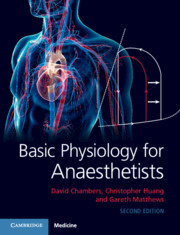Book contents
- Basic Physiology for Anaesthetists
- Basic Physiology for Anaesthetists
- Copyright page
- Dedication
- Contents
- Foreword
- Preface to the Second Edition
- Preface to the First Edition
- Abbreviations
- Section 1 The Basics
- Section 2 Respiratory Physiology
- Section 3 Cardiovascular Physiology
- Chapter 27 Cardiac Anatomy and Function
- Chapter 28 Cardiac Cycle
- Chapter 29 Cardiac Output and Its Measurement
- Chapter 30 Starling’s Law and Cardiac Dysfunction
- Chapter 31 Cardiac Pressure–Volume Loops
- Chapter 32 Cardiac Ischaemia
- Chapter 33 Systemic Circulation
- Chapter 34 Arterial System
- Chapter 35 Arterial Pressure Waveforms
- Chapter 36 Capillaries and Endothelium
- Chapter 37 Venous System
- Chapter 38 Venous Pressure Waveforms
- Chapter 39 Lymphatics
- Chapter 40 Cardiovascular Reflexes
- Chapter 41 Valsalva Manoeuvre
- Chapter 42 Exercise Physiology
- Chapter 43 Exercise Testing
- Section 4 Neurophysiology
- Section 5 Gastrointestinal Tract
- Section 6 Kidney and Body Fluids
- Section 7 Blood and Immune System
- Section 8 Energy Balance
- Section 9 Endocrine Physiology
- Section 10 Developmental Physiology
- Section 11 Environmental Physiology
- Index
- References
Chapter 42 - Exercise Physiology
from Section 3 - Cardiovascular Physiology
Published online by Cambridge University Press: 31 July 2019
- Basic Physiology for Anaesthetists
- Basic Physiology for Anaesthetists
- Copyright page
- Dedication
- Contents
- Foreword
- Preface to the Second Edition
- Preface to the First Edition
- Abbreviations
- Section 1 The Basics
- Section 2 Respiratory Physiology
- Section 3 Cardiovascular Physiology
- Chapter 27 Cardiac Anatomy and Function
- Chapter 28 Cardiac Cycle
- Chapter 29 Cardiac Output and Its Measurement
- Chapter 30 Starling’s Law and Cardiac Dysfunction
- Chapter 31 Cardiac Pressure–Volume Loops
- Chapter 32 Cardiac Ischaemia
- Chapter 33 Systemic Circulation
- Chapter 34 Arterial System
- Chapter 35 Arterial Pressure Waveforms
- Chapter 36 Capillaries and Endothelium
- Chapter 37 Venous System
- Chapter 38 Venous Pressure Waveforms
- Chapter 39 Lymphatics
- Chapter 40 Cardiovascular Reflexes
- Chapter 41 Valsalva Manoeuvre
- Chapter 42 Exercise Physiology
- Chapter 43 Exercise Testing
- Section 4 Neurophysiology
- Section 5 Gastrointestinal Tract
- Section 6 Kidney and Body Fluids
- Section 7 Blood and Immune System
- Section 8 Energy Balance
- Section 9 Endocrine Physiology
- Section 10 Developmental Physiology
- Section 11 Environmental Physiology
- Index
- References
Summary
Exercise is a major physiological challenge to the body, affecting all the main body systems. An accompanying increase in muscle metabolic rate results in an increase in O2 demand and a requirement for an increased rate of removal of CO2 and other metabolites, including lactic acid and ketone bodies. Exercise thus requires substantial increases in muscle blood flow with maintenance of mean arterial pressure (MAP). In addition, despite the increased rate of energy metabolism, normoglycaemia must be preserved. Finally, exercising muscle generates a large amount of heat, yet core temperature must be controlled.
Information
- Type
- Chapter
- Information
- Basic Physiology for Anaesthetists , pp. 178 - 184Publisher: Cambridge University PressPrint publication year: 2019
